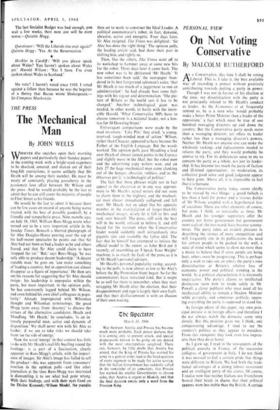THE PRESS
The Mechanical Man
By JOHN WELLS
WHOEVER else snatches open their morning papers and particularly their Sunday papers in the coming week with a bright-eyed eagerness to be shocked, amazed, and shaken out of their long-felt convictions, it seems unlikely that Mr Heath will be among their number. He must be weary of constantly playing gooseberry in the passionate love affair between Mr Wilson and the press. And he would probably be the last to admit that he can still count the majority of people in Fleet Street as his friends.
He would be the last to admit it because there can be few cases on record of anyone being worse treated, with the best of possible goodwill, by a friendly and sympathetic press. Nine months ago, on July 18, 1965, William Rees-Mogg wrote what turned out to be a very important article in the Sunday Times. Beneath a blurred photograph of Sir Alec Douglas-Home peering over the top of his half-moon spectacles he points out that Sir Alec had not been as bad a leader as he and others feared, and that Sir Alec could claim to have `stopped the rot.' But,' says Rees-Mogg, 'he was only able to produce decent leadership.' A decent capable man,' he goes on, 'can make something of leading a country, but in opposition can almost disappear as a figure of importance.' He then sets out his reasons for suggesting that Sir Alec should resign: his leadership is unpopular within the party, but most important, in the opinion polls, 'he has consistently lagged behind Mr Wilson, and even behind his own chief colleagues in popu- larity.' Already impregnated with Wilsonian thought and Wilsonian terminology, the good Mogg turns away from 'decency' to discuss the virtues of the alternative candidates, Heath and Maudling. `Mr Heath,' he concludes, 'is an in- tensely purposeful man, active and dynamic of disposition.' We shall never win with Sir Alec as leader : if we are to take risks we should take them 'on the side of energy.'
Now the word 'energy' in that context has little to do with Mr Heath's real-life bustling round the hustings: it is part of a fascination, clearly apparent in Rees-Mogg's article, with the import- ance of images. Sir Alec's image has failed to sell the product—this was apparent from consumers' reaction in the opinion polls—and like other journalists at the time Rees-Mogg was interested is dismantling it to see what had gone wrong. With their findings, and with their eyes fixed on the Divine Kennedy/ Wilson Model, the pundits then set to work to construct the Ideal Leader. A political commentator's robot, in fact, dynamic, abrasive, active and energetic. Four days later, Sir Alec resigned. The Times was delighted : Alec has done the right thing.' The opinion polls, the leading article said, had done their part in shifting him, and rightly so.
Then, like the others, The Times went off to its workshop to hammer away at some new bits for the robot. Three days later it came back. The new robot was to be christened `Mr Heath.' It has sometimes been said,' the newspaper thun- dered in its best fairground salesman's voice, 'that Mr Heath is too much of a juggernaut to run an administration': he had already hurt some feel- ings with his vigour and determination. 'The pic- ture of Britain as the world sees it has to be changed.' Another technological giant was needed, in other words. to battle with the invin- cible Harold. 'What Conservative MPs have to choose tomorrow is a national leader, not a hos- tess for 10 Downing Street.'
Extravagant comparisons were made by the mad inventors : 'Like Pitt,' they cried, 'a young, reserved, tough-minded man of action.' Wilson, rather than Chaucer. appeared to have become the Father of the English Language. But the words worked. The opinion polls gave Maudling a lead over Heath of almost sixteen points in the Express and slightly more in the Mail, but the robot men and the advertising copy writers won, and on July 27 the huge mechanical man came clanking out of the hangar, abrasive, ruthless, and as the Observer put it, 'a technologist of politics.'
The fact that these phrases might not in fact appeal to the electorate or in any way approxi- mate to Mr Heath's actual nature did not seem to alarm them in the slightest, and the mechani- cal man almost immediately collapsed and fell over. Mr Heath, not an adept like his opposite number in the manipulation of larger-than-life mechanical images. wisely let it fall to bits and took over himself. The press, still with the best will in the world, refused to believe it, and still bayed for the moment when the Conservative leader would suddenly swell miraculously into gigantic size and resemble the fallen idol. The fact that he himself has attempted to imitate the official model to the extent, as John Bird put it recently, of resembling an 'I Speak Your Weight' machine, is as much the fault of the press as it is of Mr Heath's personal advisers.
Mr Heath's personal popularity rating, accord- ing to the polls, is now almost as low as Sir Alec's before the Big Promotion Stunt began. So far the commentators have remained kind. But it might be as well for them to remember, when they start scragging Mr Heath after the election, that their disappointment and rage is largely their own fault, and that their disillusionment is with an illusion of their own making.


































 Previous page
Previous page